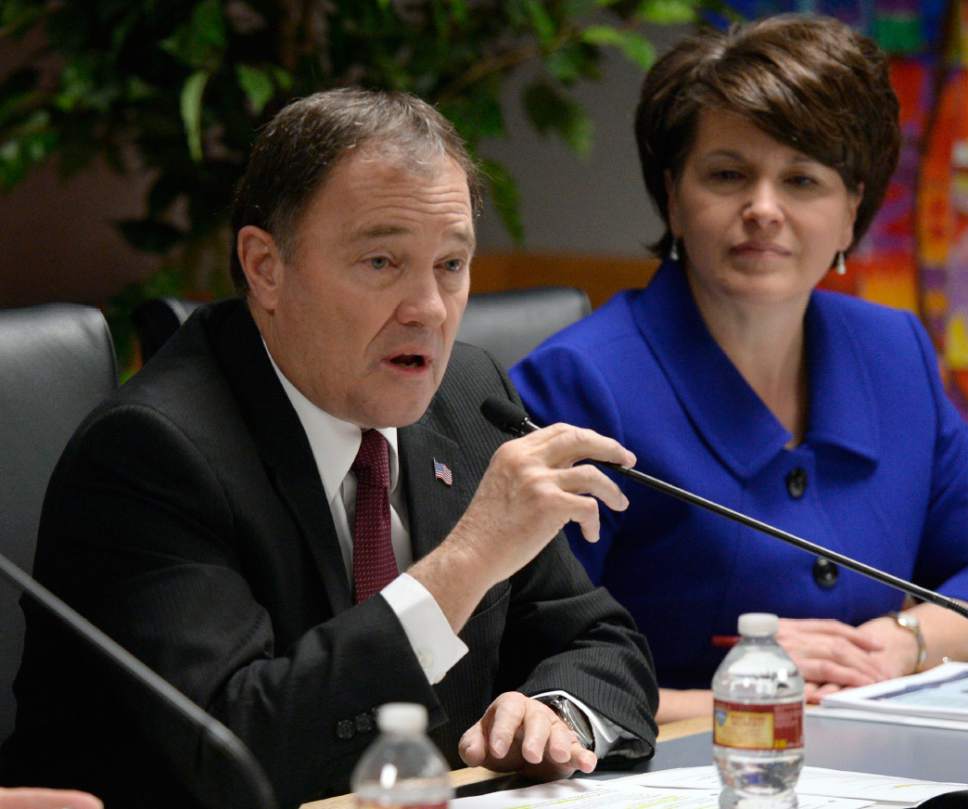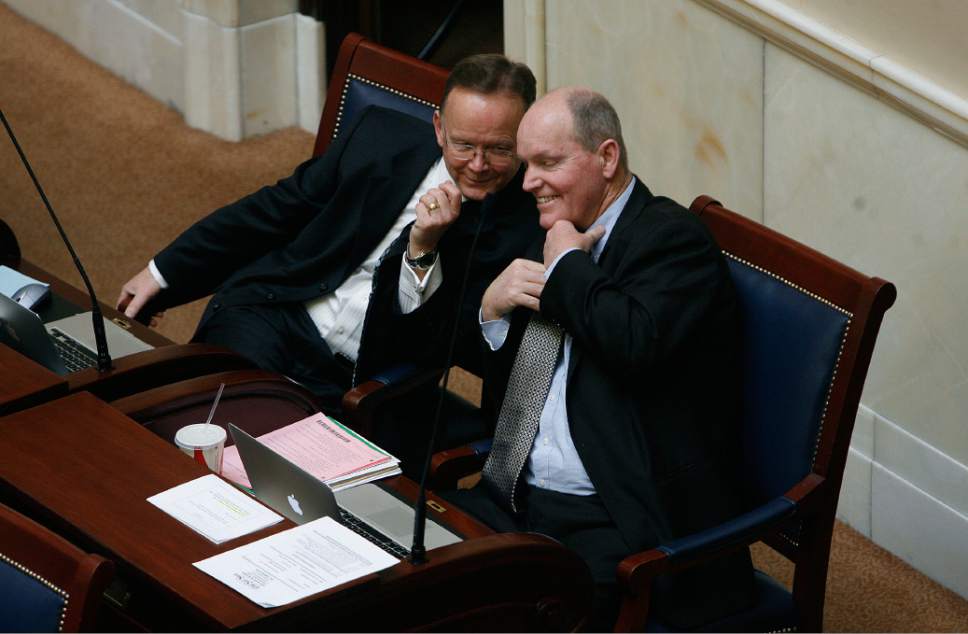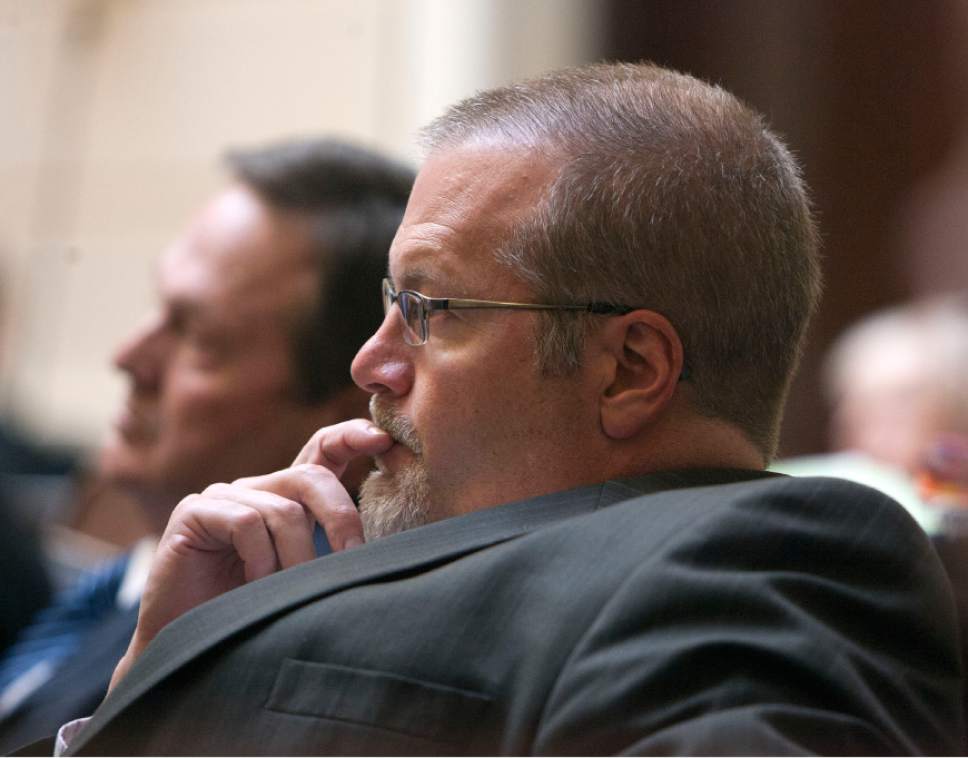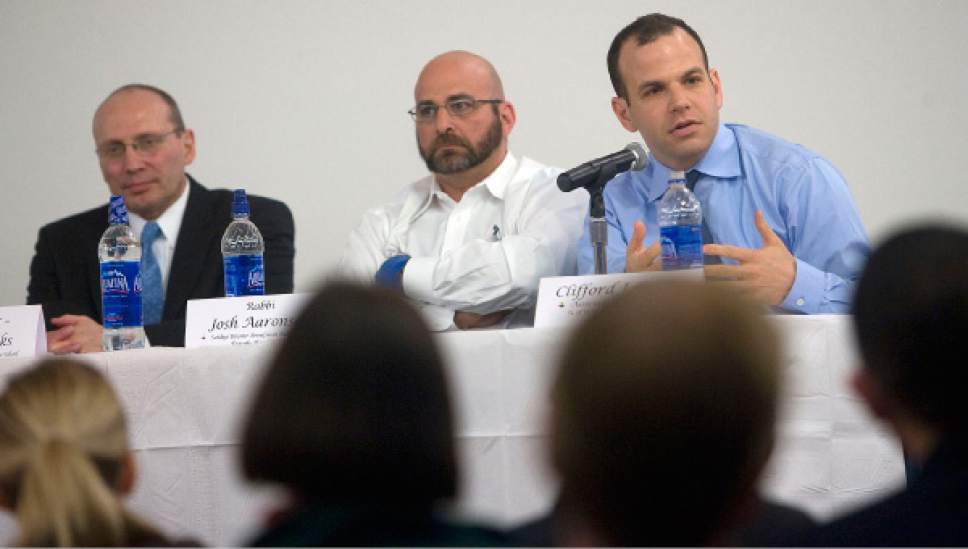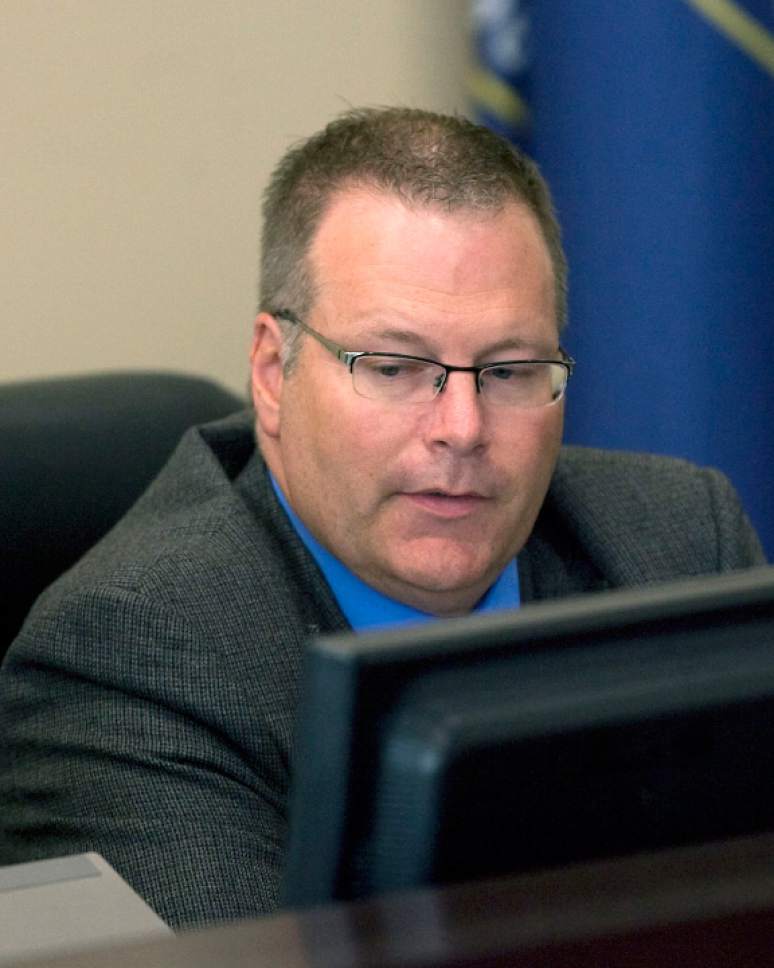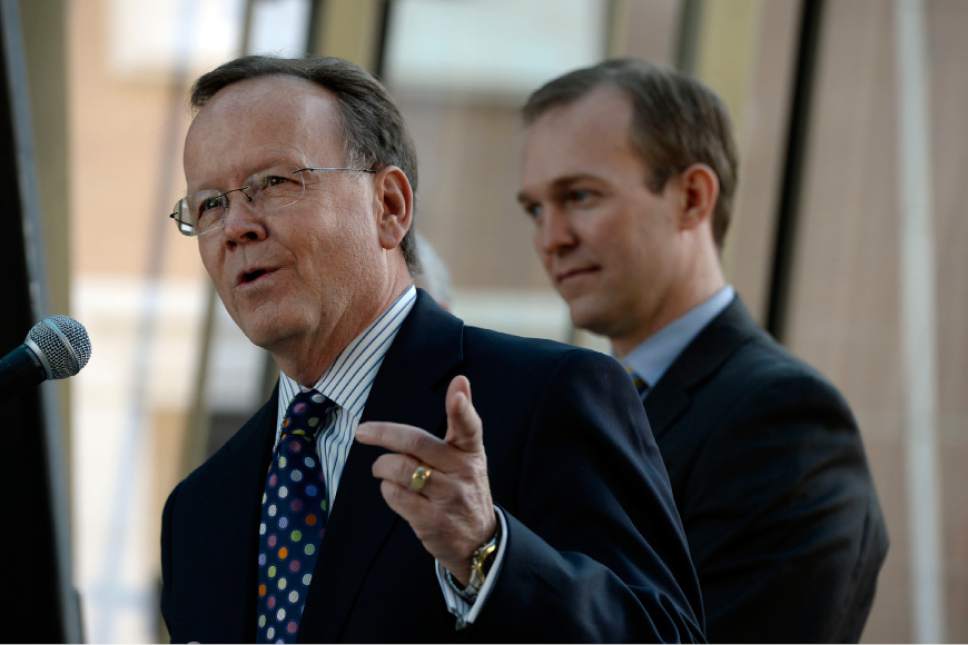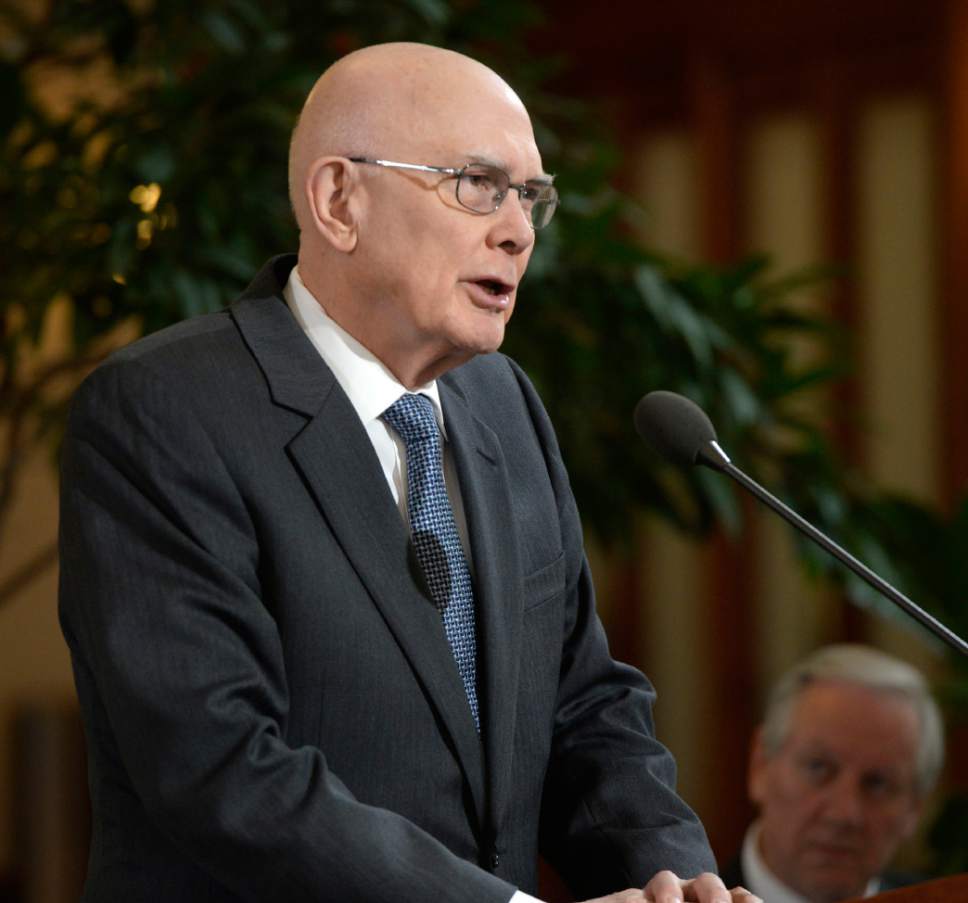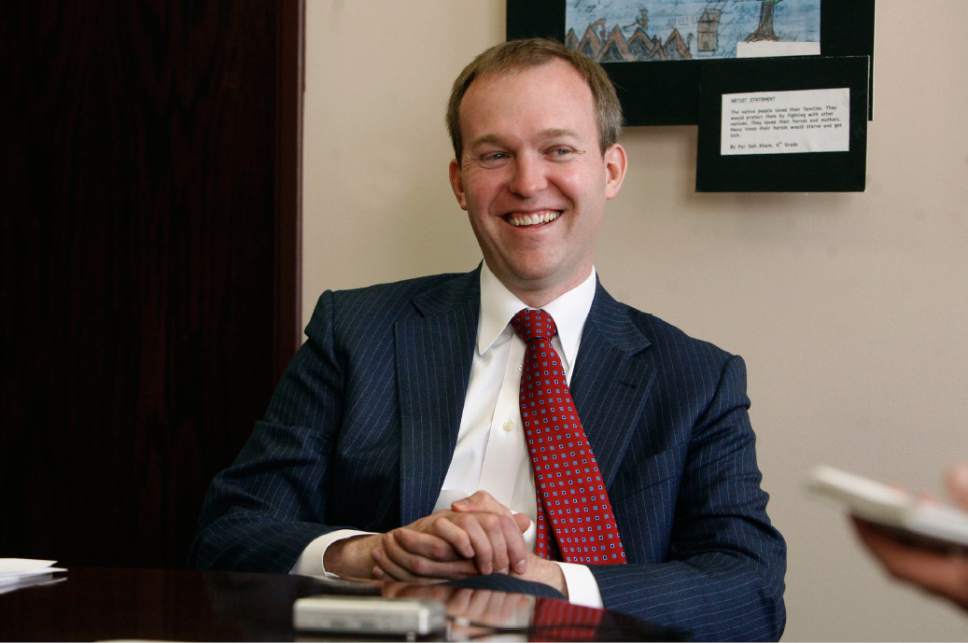This is an archived article that was published on sltrib.com in 2015, and information in the article may be outdated. It is provided only for personal research purposes and may not be reprinted.
Proponents of a law banning discrimination against gay and lesbian Utahns are hailing an endorsement from the LDS Church as a major boost for a bill that has stalled year after year.
But the backing from the state's predominant faith came with a major caveat: Any nondiscrimination bill must be balanced with protections for religious freedom, opening the door to the type of debate that has proven divisive, even explosive, in other states.
Now Utah lawmakers face the tricky task of reconciling the sometimes-contradictory objectives: banning discrimination against LGBT residents while providing legal safeguards for people to refuse services to those same residents if doing so would run counter to their religious beliefs.
Gov. Gary Herbert acknowledges that the two appear to be in conflict, but argues that religious freedoms have to be protected, citing an example of an individual — whom he would not name — who he said was fired for opposing same-sex marriage.
"So there is discrimination on both sides of the issue," Herbert said. "I think we have good people in the Legislature who are addressing the issue, and we're finding where there's conflict, but we're also finding where there's opportunity to come together. I do believe you can't have one without the other."
Two states — Arizona and Mississippi — recently passed legislation to protect religious freedom. In Arizona, Gov. Jan Brewer ended up vetoing the measure after major corporations such as Apple, American Airlines and the National Football League's Arizona Cardinals warned the bill could prove disastrous for the state.
In Utah, parties are expected to begin talks this week on how to balance the anti-discrimination bill proposed by Sen. Steve Urquhart, R-St. George, with various attempts aimed at protecting religious liberties.
Rep. LaVar Christensen, R-Draper, who wrote Utah's constitutional amendment banning same-sex marriage (which later was struck down by federal courts), had planned to have a religious-liberty bill out by now, but the measure got delayed.
Senate Majority Whip Stuart Adams, R-Layton, will take a lead role in shepherding through a compromise. Adams said he expects to have Urquhart and Sen. Jim Dabakis, D-Salt Lake City, both of whom are sponsoring anti-discrimination bills, in the discussions, along with Senate Majority Leader Ralph Okerlund, R-Monroe, and Sen. Jerry Stevenson, R-Layton.
From the House, Christensen and Rep. Jake Anderegg, R-Lehi, will be advocating the religious-liberty side of the equation.
—
The quest for compromise • Adams has opened a Senate bill file titled "Prohibition on Retaliation Against Religious Beliefs on Marriage and Sexuality," but the measure's language has not been drafted.
"I wish it were clear. We're trying to figure it out," Adams said. "This is a tough issue. … Hopefully there's something that makes everyone happy, but that's going to be hard."
Mormon officials acknowledged as much, stating that their "fairness for all" goal means that no side will get everything it wants.
Lawmakers will be seeking more input from The Church of Jesus Christ of Latter-day Saints on what exactly it envisions when it calls for institutional and individual protections for people of faith — and where the Utah-based faith is willing to compromise.
That guidance will not emanate from the two Mormon apostles who endorsed passage of a nondiscrimination bill, but instead will come in private meetings with LDS Church lobbyists — often referred to as "home teachers" at Utah's Capitol — and attorneys for the church from the firm of Kirton McConkie.
Coupling religious liberties and discrimination protections is hardly a novel concept. In December, Michigan House Speaker Jase Bolger pushed companion bills to expand religious protections while extending safeguards to lesbian, gay and bisexual individuals. The effort fizzled when Democrats and LGBT groups refused to support it because Bolger left out transgender protections.
When considering religious-freedom bills, it's natural to look at what other states have done, said Tim Schultz, president of the First Amendment Partnership, a coalition of religious leaders seeking protections for people of faith.
That inevitably leads lawmakers to the Religious Freedom Restoration Act — some version of which has been adopted by Congress as well as legislatures in 19 states and acknowledged by courts in another 11, according to the group's latest figures.
"People tend to follow a winner," Schultz said.
—
Bills go bust • That doesn't mean religious-liberty proposals always prevail, particularly when they seek individual protections against lawsuits or claims of discrimination.
Just last year, religious-freedom bills died in at least 10 states.
In Missouri, for example, legislation would have allowed religious beliefs as a defense in civil or criminal discrimination cases, except in the areas of housing and employment. Another would have let medical providers refuse to perform certain procedures based on religious objections.
In Illinois, a bill would have specified religious groups and schools didn't have to let their facilities be used for same-sex marriages.
In Tennessee, lawmakers sought to prevent gay couples from suing churches or individuals who refuse to provide services for same-sex weddings.
All these measures failed.
LDS leaders want similar kinds of individual protections. Apostle Dallin H. Oaks said the church is looking to shield its institutional rights as well as the "free exercise of religion by our members."
Bill Duncan, director of the Center for Family and Society at the Sutherland Institute, a conservative Salt Lake City think tank, points to an increasing number of instances in which people complain their religious rights have been violated.
"One of the obvious areas that hasn't been addressed before is: What about the rights of individuals where they might be asked to do something or facilitate something that might be against their religious beliefs?" Duncan said. "We ought to balance that equation a little bit. … Maybe there are some things that can be addressed and they're just a matter of good culture and civility."
—
Legalizing discrimination • Cliff Rosky, a law professor and chairman of the board for the LGBT advocacy group Equality Utah, said legal protections against discrimination for religious people already exist. There may be room for some others, he said, but broad exemptions for individual religious liberties can become problematic.
"If the Legislature were to take this idea of religious liberty and twist it and take it even further," Rosky explained, "and say employers have the religious liberty to fire people and landlords have the religious liberty to evict someone, it could completely destroy our civil-rights laws."
Pairing religious-liberty legislation with a bill that bars discrimination in housing and employment, Rosky said, suggests that faith provides an individual an exemption, a right to discriminate.
"If one of them provides a defense to the other, then it swallows the other whole," he said. "You're not actually passing a law banning discrimination; you're passing a law legalizing discrimination. I'm confident that's not what the [Mormon] church has in mind."
Salt Lake County Mayor Ben McAdams said the time may be right to strike a compromise.
McAdams — who helped negotiate Salt Lake City's 2009 bans on housing and employment discrimination, the only such measures ever to receive the overt endorsement of the LDS Church — said he ventured down the religious-liberty road with many groups when he sponsored a similar statewide bill and had some "very constructive conversations."
"The conversation kind of died in the midst of a broader discussion about [same-sex] marriage," McAdams said. "Many parties weren't interested in furthering that conversation until the marriage question had been answered."
Now it has. Such marriages are legal in Utah.
"Today the circumstances are different, and I think it's time to pick up that conversation," McAdams said, "and ... find ways that all Utahns can be treated equally and afforded the highest standards of human dignity, but also balance the values of religious freedom that are enshrined in the Constitution."
gehrke@sltrib.com Twitter: @RobertGehrke


